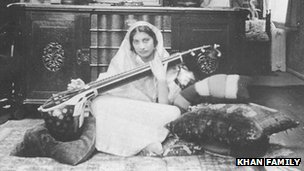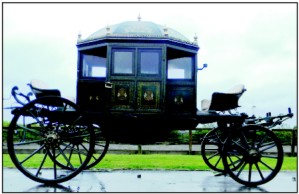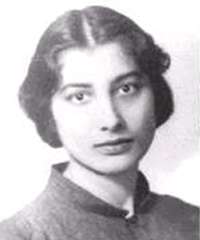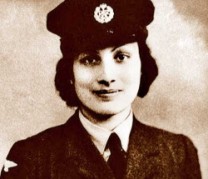The Princess Royal is set to unveil a sculpture of Noor Inayat Khan, dubbed the “Spy Princess” by her biographer Shrabani Basu in London’s Gordon Square Gardens.
Raised in Britain and France and a descendant of Indian royalty, bilingual Noor Inayat Khan was recruited by the elite Special Operations Executive (SOE) in 1942 to work in Paris as a radio operator.
Records from the national archives show she was the first female wireless operator sent to Nazi-occupied France during World War II.
After evading capture for three months, the spy was imprisoned, tortured and eventually shot by the German Gestapo at Dachau concentration camp in 1944.
Her final word – uttered as the German firing squad raised their weapons – was simple. “Liberté”.
Liberty was a notion the pacificist-turned-war-heroine held deeply, according to Ms Basu.
For her bravery, she was posthumously awarded the George Cross. In France she was honoured with the Croix de Guerre, and later with two memorials and an annual ceremony marking her death.
Indian royalty
Brave, glamorous and both sensitive and formidable, it is said she acted not out of a love for Britain, but out of an aversion to fascism and dictatorial rule.
Her father was a musician and Sufi teacher, and Noor Inayat Khan was raised with strong principles and believed in religious tolerance and non-violence.
Ms Basu claims she “couldn’t bear to see an occupied country”, a notion that seems to run in her family.
Noor Inayat Khan’s great-great-great-grandfather was Tipu Sultan, an 18th century Muslim ruler of Mysore. He refused to submit to British rule and was killed in battle in 1799.
Born on 1 January 1914 in Russia to an Indian father and American mother, the agent’s infancy was spent in London.
The family moved to France when she was a child and lived in Paris, where she was educated and learnt fluent French.

A bronze sculpture of Khan has been erected in Gordon Square Gardens on land owned by the University of London
The national archives describe how the sensitive young woman studied both medicine and music.
In 1939 the Twenty Jataka Tales, a collection of traditional Indian children’s stories she had retold, were published in Le Figaro.
When war broke out in 1939, Noor Inayat Khan trained as a nurse with the French Red Cross.
She fled the country just before the government surrendered to Germany in November 1940, escaping by boat to England with her mother and sister.
‘Tigress’
Shortly after arriving in the UK, she joined the Women’s Auxiliary Air Force (WAAF) as a wireless operator and soon caught the attention of recruiters from the SOE.
Also known at the time as Nora Baker, Khan joined the elite spy squad in 1942.
She was deployed to France a short time later despite an SOE training report describing her as “not over-burdened with brains” and “unsuited to work in her field”.
Codenamed “Madeleine”, she joined others in the resistance network Prosper, famously tasked by then Prime Minister Winston Churchill to “set Europe ablaze”.
Despite suspicions that the network had been infiltrated by a Nazi spy, Khan refused to return to Britain, risking arrest by the Gestapo.
Ms Basu – who spent eight years researching her life – told the BBC: “She was this gentle writer of children’s stories, a musician, but she was transformed. She was a tigress in the field.”

Noor Inayat Khan was raised by her Sufi father to be tolerant of other religions and a pacifist
With her team gradually captured by the Gestapo, Noor Inayat Khan continued for as long as possible to send intercepted radio messages back to England.
Despite her commanders urging her to return to England, she single-handedly ran a cell of spies across Paris for three more months, frequently changing her appearance and alias.
Eventually, she was betrayed, arrested and imprisoned. She was sent to Pforzheim prison in Germany where she was kept shackled and in solitary confinement.
She refused to reveal any information, despite 10 months of repeated beatings, starvation and torture by her Nazi captors.
Her fortitude – and two escape attempts – led her captors to brand her “highly dangerous”, despite her pacifist upbringing.
‘Inner strength’
In September 1944, she and three other female SOE agents were transferred to Dachau concentration camp where on 13 September they were shot and killed.
Ms Basu has described her life as “inspirational”, and said the modern world can draw lessons from the story of Noor Inayat Khan.
She said: “For her to come into this world on the front line taking on the Gestapo, showed her inner strength and her courage, her immense courage and resilience.
“It’s very inspiring, especially given the the troubled times that we live in. It is important to remember these qualities and values.
“Two and a half million Indians volunteered for the war effort and it was the largest single volunteer army.
“I think we must not forget their contribution. Noor was part of this.”
source: http://www.bbc.co.uk / Home> UK / by Samantha Dalton, BBC News / November 08th, 2012




